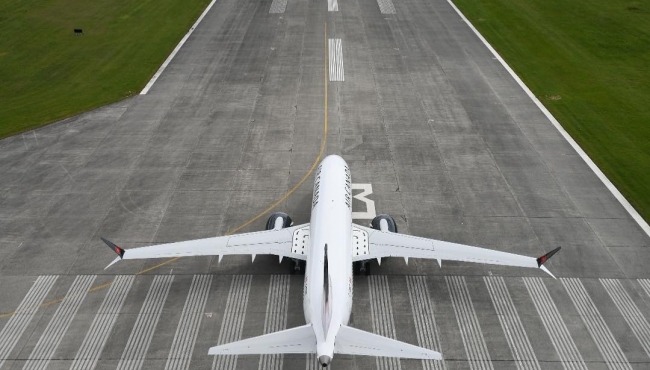03/05/2024
Environmental, Social, and Governance (ESG) issues are now seen as a key risk to aviation investments, and authorities worldwide are demanding more transparency and stricter reporting standards. It’s never been more important to understand the pathways to net zero emissions and their real-term impacts on all key players across the industry.
Each month, IBA’s ESG Consulting team share key insights and the latest news from the growing world of sustainable aviation.

European Union regulators have opened an investigation into 20 airlines for potentially “misleading greenwashing practices”. The claims are largely based on the benefits of offsetting emissions from flying; including creating incorrect impressions that paying an additional fee to finance climate projects can reduce CO2, and supporting the use of alternative aviation fuels can fully counterbalance the CO₂ emissions.
Furthermore, regulators noted that the airlines had made claims about plans to reach net zero emissions “without clear and verifiable commitments, targets, and an independent monitoring system.” The airlines were not named, however, the national regulators involved are Belgian, Dutch, Norwegian and Spanish.
As we reported last month on KLM's misleading advertisements and the airline credibility report here, IBA is beginning to see a trend in greenwashing crackdowns . It signifies a rising tide of credibility issues within the industry, and we expect more airlines to be called out soon. However, this does not take away the fact that there are airlines sincere about their sustainability efforts and therefore should be given credit when they do.

In line with its decarbonisation strategy, Airbus is collaborating with multiple airlines to reduce its Scope 3 emissions using Sustainable Aviation Fuel (SAF) for employee business travel. However, as not all airports are equipped with SAF yet, Airbus makes use of the Book and Claim system, implying that flights are not necessarily powered by this fuel type. Instead, the purchased SAF is incorporated into the fuel system at an airport near a viable production facility, guaranteeing a more effective lifecycle. Airbus tracks and validates the SAF bought to ensure that the right carbon emissions factors are applied.
Air France-KLM and Airbus are continuing their partnership with a 2024 "SAF fares agreement" following a successful pilot in 2023. Routes between Hamburg, Madrid, Marseille, Munich, Toulouse, and Paris will also have the option to buy SAF. This follows Airbus' agreement with Volotea, and Air Corsica to have SAF onboard internal charter flights between Toulouse to Finkenwerder, Germany, and Toulouse to Nantes and Saint-Nazaire in France.
IBA’s view is that further collaborations and agreements of this nature should be considered as they push the industry to innovate in their use of SAF, rather than waiting for it to become widely accessible, regardless of cost and availability. This demonstrates a commitment to achieving net zero emissions.

A new IATA research report has compared the aviation industry's leading decarbonisation roadmaps. The review compared selected roadmaps in terms of their scope, key input assumptions, modelled aviation energy demand, respective CO2 emissions and the emissions reduction potential of each mitigation lever (new aircraft technologies, zero-carbon fuels, SAF and operational improvements).
Overall results showed notable variations in how technology and solutions may advance towards net zero. While it is assumed by all roadmaps that sustainable aviation fuels would have the most impact on reducing CO2 emissions by 2050, their actual contribution ranges from 24% - 70%. According to the paper, this reflects the uncertainty surrounding the amount of investments, the potential for profit and cost of production, the availability of feedstocks, and the possibility of encouraging government action. The International Council on Clean Transportation (ICCT), Mission Possible Partnership (MPP), Air Transport Action Group (ATAG), and International Council on Clean Transportation all collaborated with IATA to conduct the first comprehensive examination of 14 significant global and regional net zero CO2 emissions by 2050 roadmaps.
IBA sees this as a positive step for enhanced strategic planning targeted at accomplishing net zero goals. However, we urge further research using various models to compare and challenge this report giving several perspectives.
IBA's ESG Consulting team supports with advice on sustainable finance, ESG ratings, ESG strategy and understanding emerging technologies in aviation. Our expert insight is powered by cutting-edge insights from our award-winning IBA NetZero aviation emissions reporting platform.
To find out more, please get in touch.